Mattie Maher
(1939–2020)
Irish bar owner Matthew (“Mattie”) Maher died in January, aged 80. The retired publican was a staple of McSorley’s Old Ale House, beloved for his affection for his customers and dedication to preserving the original aesthetic of the bar as it was ushered begrudgingly into modernity.
Born in Threecastles, Kilkenny, in 1939 to Patrick and Ellen Maher, Mattie quit school entirely at 14 to work full-time. By 25, Maher was married to Teresa Brady, and he met Harry Kirwan, then owner of McSorley’s, when Kirwan’s car broke down on a visit home. Maher stopped to give him a ride, and as thanks Kirwan offered him a job if he moved to the U.S.
Maher moved his family to New York that year to start work, eventually buying the bar in 1977. He was there for the court order to admit female patrons in 1970, when the establishment that had contemptuously ignored trends like cash registers and Prohibition was finally forced to bend to outside pressure to violate its founder’s motto: “Good Ale, Raw Onions, and No Ladies.” In fact, McSorleys’ first female bartender was Maher’s daughter, Teresa, who would respond to any disgruntled patrons by calmly stating she was about her father’s business.
Other than that, Maher was a stickler for maintaining the bar’s authenticity. He internalized the bar’s wide variety of artifacts to regale customers with incredible stories of its place in history. He even went to bat with the health department to preserve the hanging wishbones tied by patrons who left to fight in WWI and never returned.
Still, when asked by a new customer if he was the owner, Maher’s nephew Michael Brannigan told the New York Daily News that his uncle would respond easily, “No, you own the bar.”
Maher is survived by his wife Teresa, four daughters, and 12 grandchildren.
*Read more about Maher and McSorley’s in Irish America’s October / November 2019 issue.
Seamus Mallon
(1936-2020)
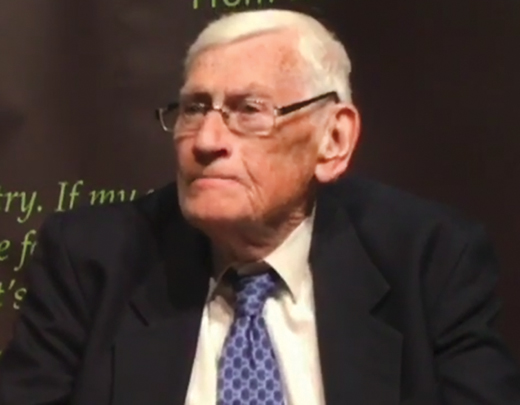
Party leader of Northern Ireland’s Social Democratic and Labour Party and vocal activist in the Irish peace process Seamus Mallon died in late January, aged 83. Mallon was responsible for establishing the fine details of the party’s position, and was the first deputy minister in the power-sharing government created under the Good Friday Agreement, which he helped to craft.
Though Mallon started out as a schoolteacher in the Protestant-dominated pocket of South Armagh where he grew up, the area was a focal point of violence from the Troubles, and he was quickly drawn into the political sphere.
He was antagonized on all sides, alienating Protestants as a Catholic, unionists as a nationalist, and the I.R.A. as a proponent of non-violence. His care for preserving the hard-won peace extended even farther than his desire for a united Ireland. He argued in his 2019 memoir that a unity vote should require at least 60 percent in favor to pass – a simple majority vote might leave Ulster unionists a disillusioned and unrepresented minority, too similar to the Catholic nationalists of the years previous to be ignored.
“I think all of us have lost a champion of democracy and justice today,” said Ulster Unionist peer Lord Empey. “I don’t believe the Good Friday process could have succeeded without him.”
Though he knew that his cancer was terminal, Mallon maintained a bright sense of humor even in planning his funeral arrangements. He stipulated to his daughter Orla that “The Bard of Armagh” be performed. When she asked by whom, he replied, “Well, nobody sings it better than me.”
Mallon is predeceased by his wife Gertrude, who died in 2016. He leaves behind sisters Maura, Jean, and Kate; daughter Orla; and granddaughter Lara.
Dr. James Mehaffey
(1931-2020)
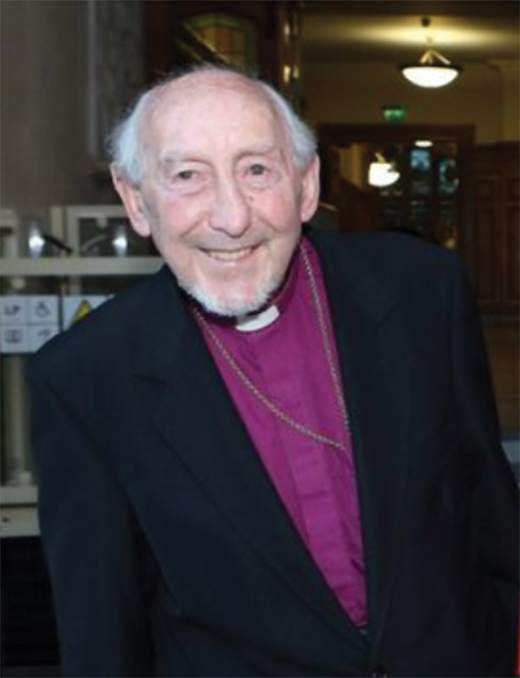
Former Church of Ireland bishop of Derry and Raphoe Dr. James Mehaffey died in early January, at the age of 88. Bishop Mehaffey was a dedicated exemplar of tolerance and peace during the Troubles, even as his diocese sat in the midst of the wreckage.
Born in Portadown, County Armagh, Mehaffey played rugby as a young man, and was a contender for the Ulster U-17 team. He continued the pastime while attending Trinity College in Dublin, even after realizing he wanted to pursue a life in the church. He was inducted a clergyman in the Church of Ireland in 1955 and made his way up the ranks over the course of several assignments before being elected bishop of Derry and Raphoe in 1980.
Mehaffey was well-known for the friendship he cultivated with the Roman Catholic bishop of Derry Edward Daly, demonstrating an idyllic relationship between Protestants and Catholics in Northern Ireland. They were founding trustees of the Inner City Trust, established to rebuild Derry’s city center after it was damaged by bombing. In honor of their decades of service, the bishops were jointly awarded the Freedom of the City of Derry in 2015.
“I didn’t pretend that I was a Roman Catholic and he didn’t pretend that he was Church of Ireland,” Mehaffey told the BBC when asked about his atypically close friendship with Daly. “We found that, in spite of our background in different churches, different theology, we had a lot in common,” he went on. “That goodwill, working with people, and reaching out to all kinds of people was important.”
“We all saw in Bishop Jim a gracious composure coupled with a steely resolve,” remarked retired Church of Ireland Archbishop Lord Eames at Mehaffey’s memorial service. “The sense that this work for peace and harmony between communities so long divided was work for the Kingdom of God, and it would not be thwarted, from whatever quarter.”
Bishop Mehaffey was predeceased by his son Philip and Bishop Daly. He is mourned by his wife Thelma, daughter Wendy, and son Tim.
Marian Finucane
(1950-2020)
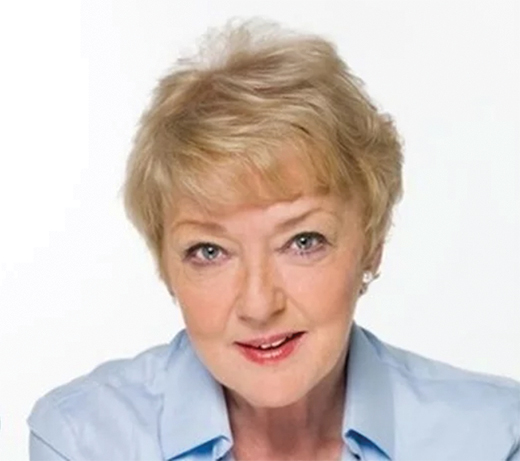
Beloved RTÉ interviewer and broadcaster Marian Finucane died in early January, aged 69. Finucane’s close to five decades in radio earned her many recognitions, including a Prix Italia, a Jacobs’ Award, Radio Journalist of the Year, and an honorary doctorate from Dublin Institute of Technology.
Though she attended university with plans to become an architect, Finucane admitted, “I got involved with intervarsity debating and I spent a hell of a lot more time talking about politics than I did about architecture.” She was told she should audition for RTÉ, and once she did, she never looked back.
Her enjoyment of what she did came through in her enthusiasm and proficiency, but she put it into words in a 2013 interview with the Irish Independent: “Sometimes I think how lucky am I to be part of the national conversation, to be meeting all these extraordinarily interesting, or boring [with a laugh] people and to engage with them.”
Through work and travels she came into contact with countless people in need, and went out of her way to help them however she could. After visiting South Africa and seeing firsthand the devastation wreaked by the HIV pandemic, particularly on young children, she and her husband John started the foundation Friends in Ireland, which takes in orphaned and otherwise vulnerable children with HIV to ensure they are treated properly. After her daughter Sinead died of leukemia at age 8, Finucane began working with many hospice charities, since her own experience had affected her so closely.
In a tribute at Finucane’s funeral service, her husband John spoke through thick waves of emotion, recollecting “my Marian – a woman who I’ve loved for 40 years. A woman who, for me, always made the colors brighter, the world a bit easier to live in.”
Finucane was predeceased by Sinead, who died in 1990. She leaves behind John; son Jack; stepchildren Jocelyn, Neil, and Timothy; and siblings Therese, Dorothy, Noel, and Tomas.
Larry Gogan
(1934-2020)
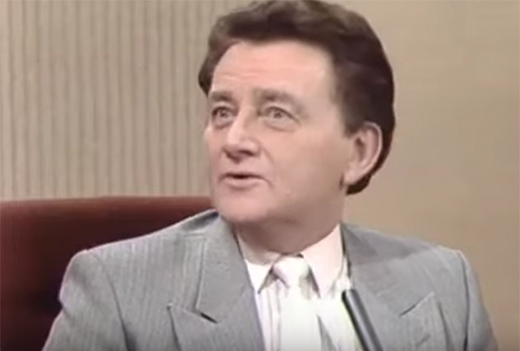
RTÉ broadcaster and disc jockey Lorcan “Larry” Gogan died in early January. He was 85. Gogan’s 40 years as D.J. for RTÉ 2FM accounted for more than two thirds of his broadcasting career, with thousands of listeners tuning in to hear him introduce classics on his show The Golden Hour, during which he conducted the infamous Just A Minute quiz game.
Gogan was born in Dublin, and knew he wanted a career in radio from the time he was young. He crafted his performing skills with parts in plays including Life With Father and Juno and the Paycock as a teenager. After graduating, he worked for his family’s shop in Dublin, where he met and recognized a broadcast radio producer. He asked her for an audition and was granted one on the spot. They liked his voice, and the rest was history.
From the very first band he played on the RTÉ 2 (The Boomtown Rats) Gogan was committed to putting Irish acts on the air, which earned him many friends in the vibrant community of Irish music. “He advocated for Irish artists and Irish music throughout his career,” noted RTÉ’s Jim Jennings. “This, in many ways, was his unique quality: he was loved by the listener, and loved by the artist.”
To Gogan, the choice was simple, and he didn’t understand why his younger peers didn’t do the same. “They seem to be slaves to the British charts for some reason,” he told RTÉ Guide in 2005. “If it’s good, play it. There’s loads of Irish rubbish out there but there’s loads of British and American rubbish as well.”
In spite of that criticism, Gogan loved his job, and was notorious for keeping every demo and album anyone sent to him, regardless of who they were, and listening to what they had to offer, with a magnanimous attitude that is uncommon in the music business that made him beloved by up-and-coming musicians in particular.
Larry is preceded in death by his wife Florrie. He is mourned by children Gerard, Orla, Grainne, David, and Sinead; and 12 grandchildren.
Arty McGlynn
(1944-2020)

Traditional Irish music performer and guitarist Arty McGlynn died in December of 2019. A long career peppered with performances with stars including Van Morrison and Christy Moore saw McGlynn a well-loved and renowned pillar of the traditional and folk music community in Ireland, and the recipient of the lifetime achievement award from TG4 in 2016.
Born in Botera, County Tyrone, into a family of talented musicians, McGlynn’s vocation was less a choice than it was an inheritance. He received his first guitar from his mother at the age of 11. He got his start as a professional musician as a guitarist in the showbands Brian Coll and the Plattermen and Frankie McBride and the Polka Dots. He met, married, and started a family with fiddler Nollaig Casey in his 18 years travelling with showbands, and uncovered a reborn love for his traditional roots by playing old tunes in his off hours on the road.
He turned back to those roots completely to play with Paul Brady, providing guitar instrumentals on his album Hard Station, then moved on for a time to play with Makem and Clancy, eventually settling for a seven-year period with a spot in Van Morrison’s band.
Even as his name gathered notoriety and began to draw crowds on its own steam, McGlynn preferred to play in the background. “I always see myself as a side man more than a front man,” he confessed in an interview with Irish Music Magazine in 2004.
But critics and audiences alike knew talent when they saw it, and they saw it in Arty in spades: “It would be difficult to name anyone playing music who is the equal of Arty McGlynn for subtlety and complexity of harmonic invention,” wrote critic Kenny Mathleson.
McGlynn leaves behind wife and partner Nollaig Casey and five children.
Mary Higgins Clark
(1927-2020)
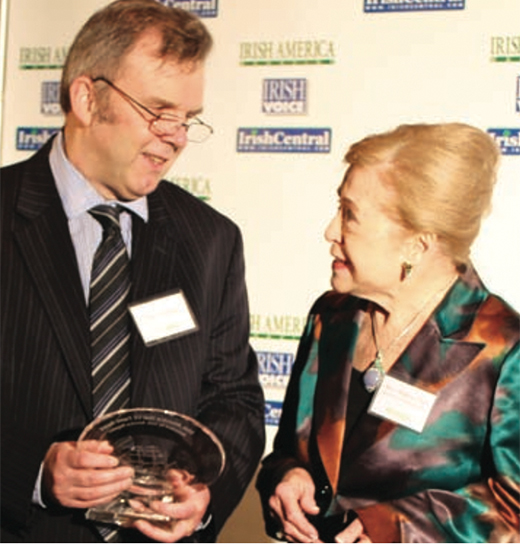
Award-winning, best-selling novelist, and treasured friend of this magazine Mary Higgins Clark died in late January, aged 92. With over 50 books and 21 honorary doctorates to her credit, Clark received numerous prestigious awards: being recognized by the Pope as a Dame of the Order of Saint Gregory the Great, the Gold Medal of Honor from the American-Irish Historical Society, the Ellis Island Medal of Honor, and Family Heritage Award. She also had an award named after her by the Mystery Writers of America. Clark was an inaugural inductee into Irish America’s Hall of Fame in 2011, the year she was grand marshal of the St. Patrick’s Day parade.
Born in 1927 to a first-generation Irish American and an immigrant from Roscommon, Clark’s love of and talent for writing had been cultivated from a young age by her mother, she recalled in an interview with Irish America, who encouraged “every word I wrote as though it were scripted by the angels.” She grew up in the Bronx in a fairly secure middle-class existence until her beloved publican father died when she was 12. With “$2,000 and three children,” her mother began renting rooms to make ends meet, offering “Kitchen privileges” to entice boarders, which inspired the name of Clark’s 2002 memoir.
Clark held a job from her youth to contribute what she could, ending with a year as a Pan Am stewardess before marrying Warren Clark, with whom she had five children: Warren, David, Carol, Pat, and Marilyn. She wrote several short stories and submitted them to magazines, taking the seemingly endless rejection slips in stride. When Warren died of a heart attack in 1964, Clark went back to work, eventually landing a job writing pieces for a historical radio program. While any less determined person might have thrown in the towel on pursuing her dream as a single mother with five young kids, Clark pushed herself and set aside 5:00-7:00am every morning to write. While doing research on George Washington for work, she became fascinated by his relationship with his wife, Martha, and the pair became the locus of 1969’s Aspire to the Heavens, which bookstores would invariably shelve with spiritual works. It did not sell until it was re-released years later, under the more marketable title “Mount Vernon Love Story.”
Her next novel claimed another real-life inspiration. When a young mother was accused of murdering her children in cold blood, Clark began asking herself the questions that would inform the advice she later gave young writers: What if..? and Suppose..? Those two initial questions led to the 1975 release of Where Are the Children?, purchased by Simon & Schuster for $3,000. It was a bestseller, and her next one sold in seven figures. From then on, Clark’s books basically reserved the number one slot on the New York Times’ Best Seller list.
Beyond the 37 solo works to her credit, Clark co-wrote several times with her daughter on Carol’s Regan Reilly detective series, and later with Alafair Burke, launching their Under Suspicion series.
Clark also became an inspiration to late-in-life sweethearts everywhere when she married her “Spouse Extraordinaire,” former Merrill Lynch Futures CEO John Conheeney in 1996, after meeting him at a St. Patrick’s Day party. Their blended family was the joy of her life, and he would accompany her on book tours before his death in 2018. “I had a prince at the beginning and a prince at the end,” she told Irish America in 2011.
In an online tribute recalling his close friendship with and admiration for Clark, Cardinal Timothy Dolan extolled, “You’re a class act ’til the end, dear Mary! Your laugh, your wit, your smile, your wisdom, your faith…you!…are eternal!”
Clark is predeceased by Warren, John, and her brothers Joseph and Johnny. She leaves behind five children, four stepchildren, 17 grandchildren, and two great-grandchildren. ♦

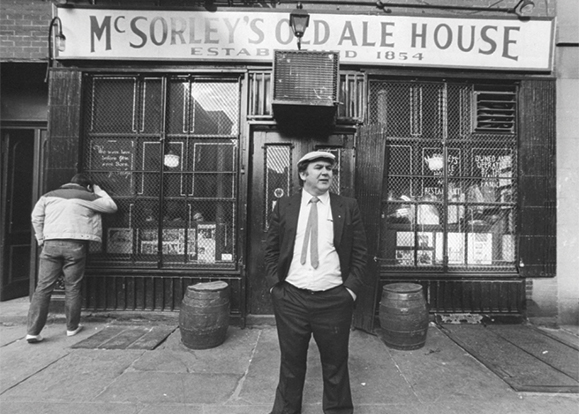
Leave a Reply